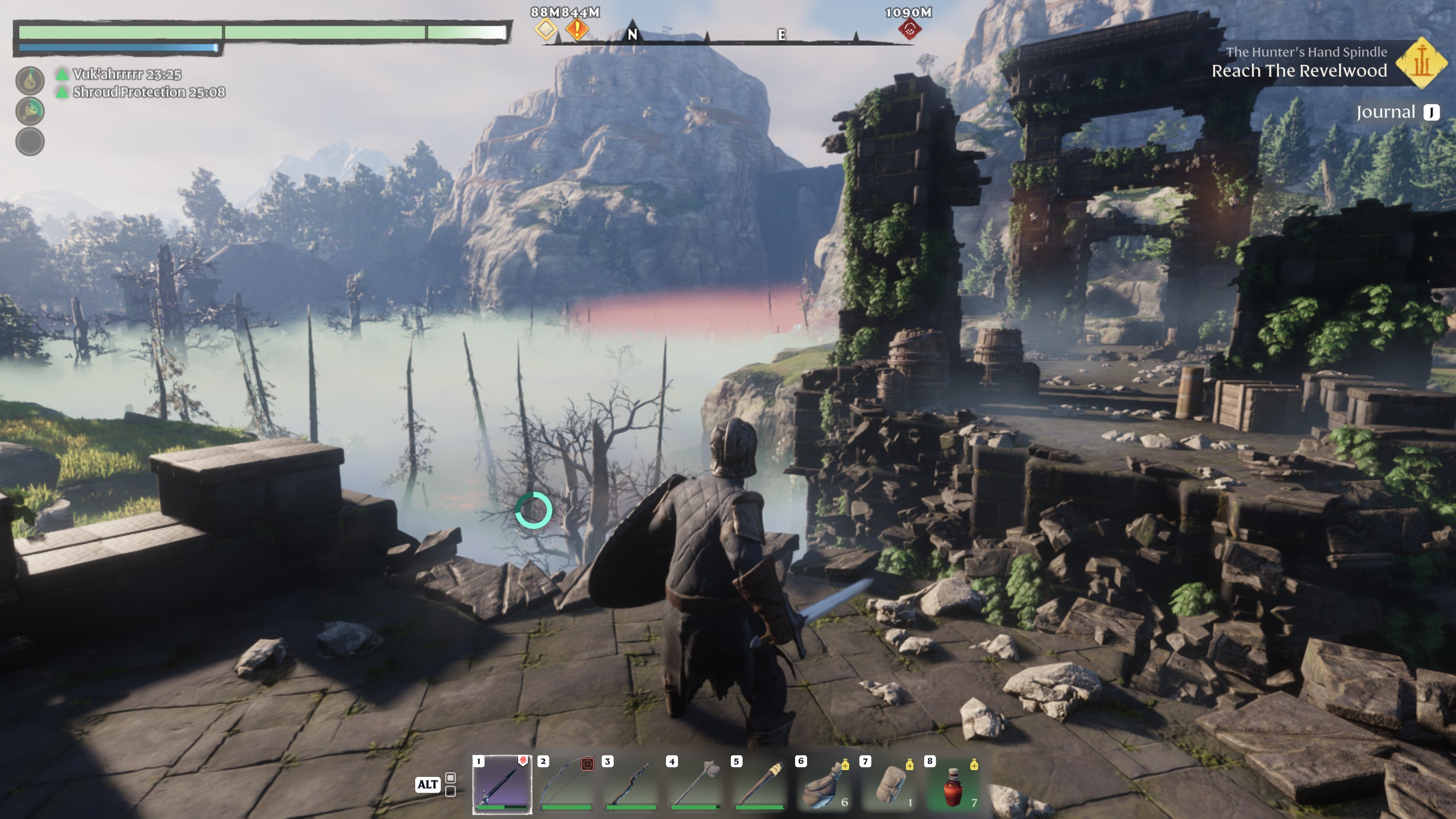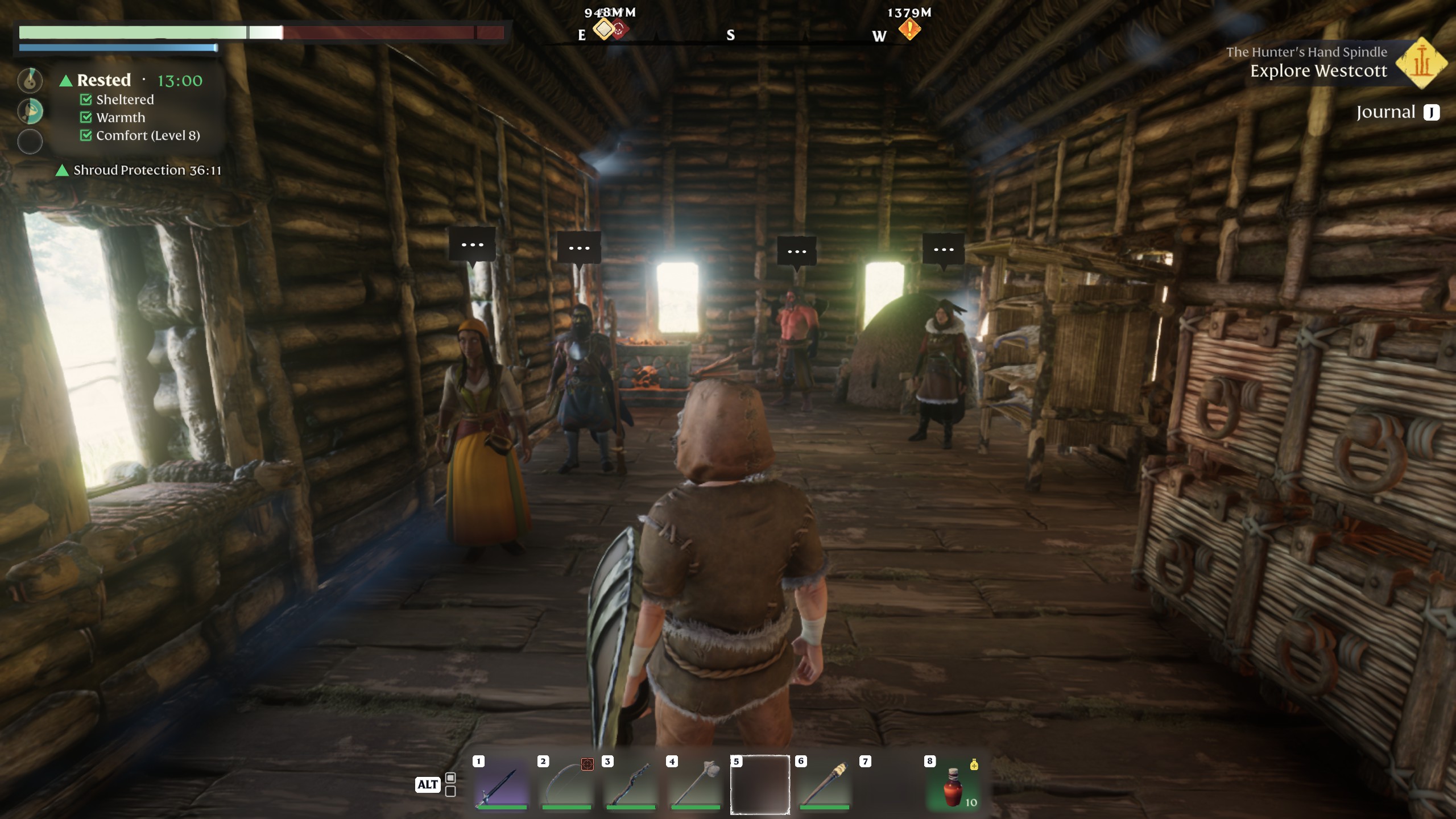Co-op survival RPG Enshrouded: forgiving survival systems in a surprisingly massive open world
Just in case you forgot, there's actually *two* big early access survival games out this month.

Hey, fellow survival fans! I know you're all a little busy right now playing… well, do I even need to name it? The early access open world co-op survival game that has somehow already become the second-most played game ever on Steam by concurrent player count since it launched just last week?
But if you can take a break from mistreating adorable offbrand Pokémon in Palworld for a few minutes, there's this whole other early access open world co-op survival game launching this week you might want to give your attention to: Enshrouded.
Despite all those shared adjectives the vibes in Enshrouded are quite different than Palworld. It's more of a Valheim crossed with Zelda thing: a big, mysterious, and mostly serene fantasy realm where you build a base, craft gear and weapons, cook over a campfire, go exploring, fight monsters, and complete quests. And, if you like, you can bring along a whole bunch of your friends for the adventure—Enshrouded supports a somewhat ridonkulous 16 players.
The realm in Enshrouded has hit hard times—the shroud of the title has consumed much of the land in a hazy murk that saps your life force and mutates living things into twisted monsters. As a newly awakened member of the Flameborn you need to reclaim the world from the evil fog and that means… well, it's a survival game, so it means chopping down trees, picking up rocks, building a hut, and crafting some starter gear. Once a base is established and a few local wolves and rabbits have been hacked into fur and meat chunks, it's time to start exploring the world both above the deadly shroud and deep within it.
The world is a big one. A real big one. In the 18 hours I've played I estimate I've only uncovered maybe a sixteenth of the total map. It can be a difficult world to explore, though mostly in a good way. More than once I've been headed toward an icon on my map only to run into, for example, an entire mountain range. Maybe I can scale that mountain by doing a lot of running and jumping, but sometimes I need to divert around it instead, which could lead me to a massive enshrouded gorge, or a huge river of lava, a sheer cliff face, a ruined town full of monsters, or some other obstruction.

Going around or through those obstacles can lead to others, and before I know it what seemed like a short journey north has turned me in a completely different direction and I've been sent even further from my destination than when I started. Just like a good adventure should. There are plenty of icons on my map that I still haven't been able to reach simply because I haven't found a viable route yet, even with a glider and grappling hook in my pack.
At the same time, the world can feel a bit on the empty side, because between those points of interest there's sometimes just not all that much to find other than some nice scenery and a few intermittent monster attacks. It's also a world that pretty strongly cries out for a mount of some sort. A little horsey would go a long way in Enshrouded, a friendly creature to ride so it's not always 100% running across great distances along with some intermittent gliding. (And for all I know, maybe there are mounts somewhere? Like I said, there's a ton of the world I've yet to visit.)
The biggest gaming news, reviews and hardware deals
Keep up to date with the most important stories and the best deals, as picked by the PC Gamer team.

Enshrouded is so forgiving I almost can't call it a survival game.
As a survival game, Enshrouded is so forgiving I almost can't call it a survival game. Taking a cue from Valheim (like many survival games do), cooking and eating isn't a necessity, it's just beneficial to your health bar or can buff your damage or stamina. You also don't lose most of your stuff upon death—die and you'll keep all of your equipped gear, crafted items, and everything in your two rows of quickbar slots. The only stuff you'll lose will be raw resources you've collected and are storing in your inventory, which means sometimes I go back to retrieve my gear, but other times I just shrug and go do something else.
Often even retrieving your stuff isn't a terrible hassle. I miscalculated a glide across a lava river and died, but my tombstone of goods was placed at the edge of the cliff where I jumped off rather than at the bottom where I perished. That gives me license to make as many stupid repeat gliding attempts as I want, really. (I made four attempts. I died each time.)

Just as forgiving as the survival systems is the skill tree. There are no classes, but gain some XP and you can spend points on skills that travel in any direction you want—toward wizardry, tanking, stealth, survival, and so on. Respec is cheap, too, so if you find a new weapon or wand you want to main it's a snap to redistribute your skill points and completely change your build. I was partaking in extra damage from stealth ranged attacks with a minor in maging until I found a wicked battleaxe in a chest. Now I do a double jump with a ground pound attack to hit crowds of enemies at once. When I find something better, I might change my build all over again.
Looking at my map, there are now several sad little tombstone icons forming a fenceline of failure.
Apart from a few quests guided by journals telling me to wipe out a shroud boss, most have revolved around rescuing a collection of NPC craftspeople—a blacksmith, hunter, farmer, alchemist, and a carpenter. Those missions are fun and feel vaguely Zelda-ish: find a mysterious, multi-level temple filled with hidden switches and traps, then navigate your way through them and come out with some extra treasures and a new pal, er, companion. Back at my base I can place these NPCs where I want and they open up new crafting recipes and work benches. I do wish these NPCs felt more like, y'know… people. Once in my base they just stand where I placed them. It'd be nice if they walked around a bit as if they were guests and not simply quest-giving furniture.
The next round of quests mostly involves retrieving tools for those same NPCs, like the carpenter's table saw and blacksmith's forge. This is where the skill curve leaps up pretty dramatically. I'm used to smelting ore into ingots and cutting logs into planks being some pretty early game activities, but just trying to reach the parts of the map the quests to acquire these items is pretty brutal for a low-level character. Crossing a certain region of the map introduces some real nasty foes. Looking at my map, there are now several sad little tombstone icons forming a fenceline of failure.

I'm liking Enshrouded for the most part so far—it's got a nice mix of cozy crafting and basebuilding, plus dangerous expeditions into deadly zones of the map—but it hasn't entirely grabbed me yet the way a game like Valheim did. Seeing craftsmen standing stock still in my base, compared to watching Palworld's critters run around doing all my chores for me, it's a little hard to not want a bit more from Enshrouded's NPCs. It's definitely a lot more fun with friends: the hour or two Andy and I spent exploring and getting bodied by a shroud boss was a hoot.
I still plan to keep playing, but it hasn't quite won me over. It's a game in that gray zone—I feel engaged with various crafting projects and I'm keen to take more long exploratory romps through the map, but for a world full of magic it hasn't felt all that magical yet.

Chris started playing PC games in the 1980s, started writing about them in the early 2000s, and (finally) started getting paid to write about them in the late 2000s. Following a few years as a regular freelancer, PC Gamer hired him in 2014, probably so he'd stop emailing them asking for more work. Chris has a love-hate relationship with survival games and an unhealthy fascination with the inner lives of NPCs. He's also a fan of offbeat simulation games, mods, and ignoring storylines in RPGs so he can make up his own.

